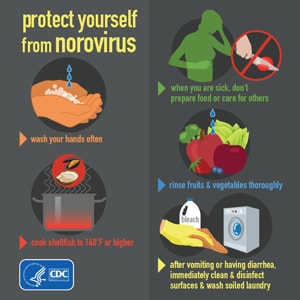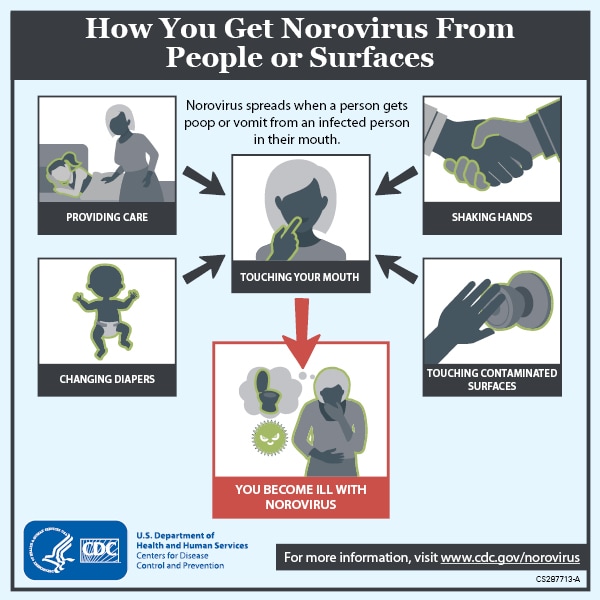Life
How To Avoid Getting Norovirus From Your Kid
The word "norovirus" is enough to make just about anyone shudder. If you've never had it, consider yourself lucky. It's one of the most contagious viruses on the planet and can make you violently ill with vomiting and diarrhea (fun, right?). If you're a parent, keeping norovirus out of your home is probably pretty high up on your winter to-do list. But can you actually prevent it? If you're wondering how to avoid getting norovirus from your kid, listen up: because science has your back on this one.
Even though the illness caused by norovirus is sometimes called "the stomach flu," it's not the same as The Flu that you get from Influenza. You can get an immunization against several strains of The Flu, which causes respiratory illness, but that won't help you one bit against norovirus. While scientists have been trying to figure out how to develop a vaccine against norovirus, they aren't quite there yet. In fact, it was only last year that scientists were able to create the virus in a lab setting for the first time. Prior to that, they'd been working with a feline virus that was similar, but not exactly the same. This is actually a really important development when it comes to finding a way to prevent norovirus outbreaks.
And norovirus does tend to occur in outbreaks: schools, nursing homes, and cruise ships are popular places for it to spread — and it does so very quickly. One reason that the virus is so contagious is that you actually only need to ingest a few particles to get sick — as few as 18, according to the CDC. But there can be hundreds of millions of particles in the vomit of someone with norovirus — which means the potential for infection is pretty high. Symptoms can come on 24-48 hours after exposure, too, which means that it isn't unusual for entire families to get it at the same time.

Norovirus is a really "smart" virus: all those symptoms are designed to make sure that we spread the virus as far and wide as possible. So, the really intense vomiting and diarrhea isn't just meant to make us feel lousy, it's the viruses way of making sure we infect everyone around us, too.
And it gets worse. A person with norovirus is contagious not just while they're sick, but for several weeks after they stop having symptoms. That means that if they're not being diligent about hand washing (as many kids aren't) they're still spreading norovirus onto the surfaces they're touching after they use the bathroom. The same goes for people who have jobs where they prepare food (or, you know, parents preparing food for their family, because everyone has to eat).
All that being said, it might sound like resistance is futile once your kid comes down with the bug. But once you understand how the virus operates, avoiding infection is actually a lot more common sense than anything else.

One of the most common misconceptions is that viruses can be killed with hand sanitizer. Most alcohol-based hand sanitizers are antibacterial, not antiviral, which means they don't kill viruses. Viruses actually can't be "killed" — which is why often the best defense against norovirus and other viruses is really good hand washing skills. When you're at the sink and lathering up, you're actually rinsing the virus particles down the sink with the soap. It's the rinsing part that's important, which is why a lot of hand sanitizers on the market don't help when it comes to norovirus.
There are a few chemicals that seem to be effective at disarming viruses — including Ebola — and scientists think they may prove helpful in stopping the spread of norovirus, too. The active ingredient is benzethonium chloride, which is an antimicrobial. In high enough concentrations, hand sanitizers that have benzethonium chloride in them were found to be effective against norovirus in a 2012 study.
So, you've got a few options for keeping your hands clean — but what about your house? Kids (and adults for that matter) don't always manage to keep their sickness relegated to one place, and even if they do, if you have to share a bathroom you might consider yourself doomed. In terms of cleaning services, bleach is still the prevailing way to disinfect doorknobs, bathrooms, and countertops. Disinfectant sprays and other fancier stuff you can buy just don't have enough chemical oopmh when it comes to norovirus. That being said, washing clothes and bedding should always be done as soon as possible, separate from other people's laundry, and in very hot water. If there's nothing in there you're worried about staining, throw some bleach in as well.
If you're caring for a sick child who is actively vomiting, remember that the surfaces in the room where they're sick are just as likely to be covered in virus particles as your kid is. If you have disposable gloves for cleaning with bleach (as you should because it's very corrosive to skin), throw on a pair while you're handling soiled laundry.
The other thing to consider is that if you're hanging out with your child while they're actually vomiting, some of those virus particles can actually become aerosolized. While you definitely shouldn't avoid comforting your child when they're sick just because they're contagious, if you can keep your face away from the direction of the vomiting, you're doing yourself a favor. If you happen to have any surgical masks hanging around, you could always throw one on — which would probably help take the edge of the bleach fumes from when you clean up, too.
If you're still feeling defeated, consider this: geneticists have figured out that a few extremely lucky people are actually genetically resistant to at least one strain of norovirus. The reason for this has to do with the same genes that determine our blood type. Most of us express our ABO type in cells other than blood cells, including those in our saliva and intestines. Some people, however, do not "secrete" their ABO blood type in those other cells. These people are then called "non-secreters," and non-secreters have been found to be remarkably less susceptible to norovirus. The reason for this is that when the virus enters our body, it looks around for the cells "labeled" with our blood type as a way to "get in" and make us sick. But because non-secreters don't have those in their intestines, the virus has nowhere to go.
So, if someone in your family is lucky enough to be a non-secreter, they might have norovirus prevention down to an art (or, in this case, a science). The rest of us will have to stick to our good hygiene practices and hope for the best.
